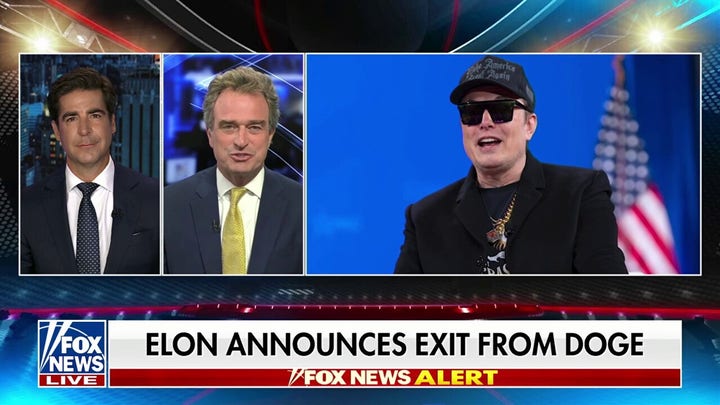As Elon Musk steps away from his official role at the Department of Government Efficiency (DOGE), he joins a history of presidential administrations that have attempted to streamline government – with mixed results.
While former Presidents Thomas Jefferson, Andrew Jackson and Grover Cleveland all tried to downsize the judiciary, treasury and civil service, respectively, it wasn’t until the 20th century that the federal government grew into the bureaucratic behemoth it is that has drawn true DOGE-type attention.
Though often seen as the bigger spenders, some Democrats joined Republicans in the 1990s to shrink the size of government and make it more accountable to taxpayers.
‘We know big government does not have all the answers,’ former President Bill Clinton said during his 1996 State of the Union.
‘We know there’s not a program for every problem. We have worked to give the American people a smaller, less bureaucratic government in Washington – and we have to give the American people one that lives within its means.’
‘The era of big government is over,’ he said, in a phrase that had largely been considered the closest emulation of DOGE thought until Musk arrived on the scene.
Clinton also sought welfare reform and emphasized personal responsibility over dependency on the state.
The Arkansan also called for slashing the bureaucracy by 200,000 jobs and worked with then-House Speaker Newt Gingrich, R-Ga., to balance the federal budget.
President Donald Trump’s efforts to do the same have received a very different response from the left.
Clinton, working with congressional Republicans – while also frequently sparring with them – was able to reduce the federal workforce somewhat and establish a budget surplus but also failed to realize entitlement reform, something that more recent fiscal hawks have also struggled with.
Clinton won his 1992 upset as a centrist, after incumbent Republican George H.W. Bush was lambasted for reneging on his ‘Read my lips – no new taxes’ pledge, with a statistical boost from industrialist independent H. Ross Perot, who won the votes of many erstwhile Bush supporters.
Clinton and then-Vice President Al Gore established a National Performance Review (NPR) that drew some parallels to today’s DOGE, and cut the bureaucracy to 1960s levels.
Bill Clinton went on to win re-election over otherwise popular GOP stalwart Sen. Bob Dole, of Kansas, in 1996.
In 1980, actor-turned-California Gov. Ronald Reagan took the White House with promises similar to another celebrity-turned-politician who would do the same 36 years later.
The Gipper did not succeed in abolishing the Department of Education – created only a few years prior by President Jimmy Carter – something Trump has also sought.
But, he reinvigorated a new generation of conservatives who still praise him for slashing income taxes, seeking to ‘starve the beast’ via forced discretionary-spending cuts, and took on public-sector unions when he essentially won a dare against air traffic controllers who went on strike by firing them all and prohibiting their rehiring.
Reagan’s closest iteration of DOGE was the 1982 Grace Commission, studying cost-cutting and efficiency – and led by Maryland chemical executive J. Peter Grace along with dozens of ‘commissioners’ plucked from the private sector.
In the executive order creating the Grace Commission, it was tasked with examining ‘the entire federal government for areas of inefficiency, mismanagement and waste, and to recommend savings without raising taxes or cutting essential services.’
Within its three-year lifespan, the commission reported $424 billion in savings, including waste, fraud, abuse, over payments to government vendors and billions in unpaid taxes.
Reagan, however, faced the same resistance from the proverbial ‘Swamp’ in trying to implement the commission’s findings.
‘We’re not trying to hurt anyone. But the American taxpayer is being ripped off,’ Grace said at the time.
While ushered in as a conservative pragmatist, Reagan’s later years saw budget deficits grow, and the national debt more than double. The Dow also lost nearly one-quarter of its value on ‘Black Monday,’ Oct. 19, 1987.
The other contemporary president known for trying to ‘DOGE’ government was Texas Democrat Lyndon Johnson. LBJ was known for rapidly expanding government through his ‘Great Society’ social programs but also took aim at streamlining the Pentagon and Defense apparatus.
Efforts at the Pentagon largely failed, as the ongoing Vietnam War also accentuated costly balance sheets.
Defense Secretary Robert McNamara, a Kennedy holdover and former Ford Motor Company chief, was employed to make changes at the Pentagon.
He instituted what was called the Planning Programming Budgeting System, which sought to bring a more streamlined approach to managing the Pentagon’s budget.
However, the vast size of the defense bureaucracy – along with resistance from some military leaders – undermined the effectiveness of Johnson’s and McNamara’s reform efforts.


